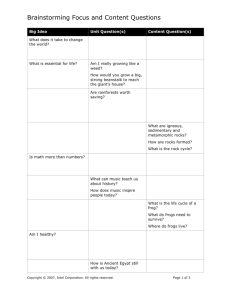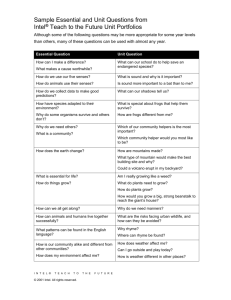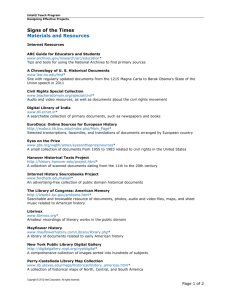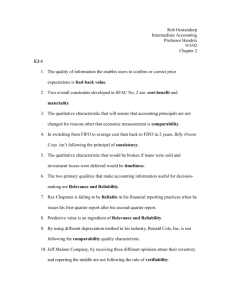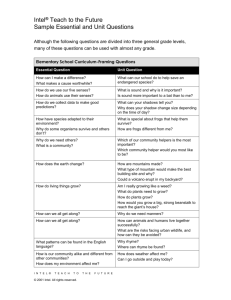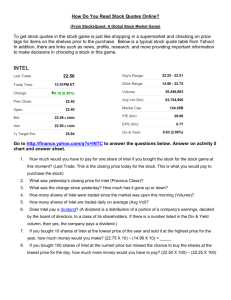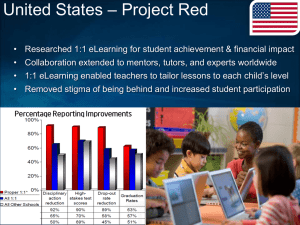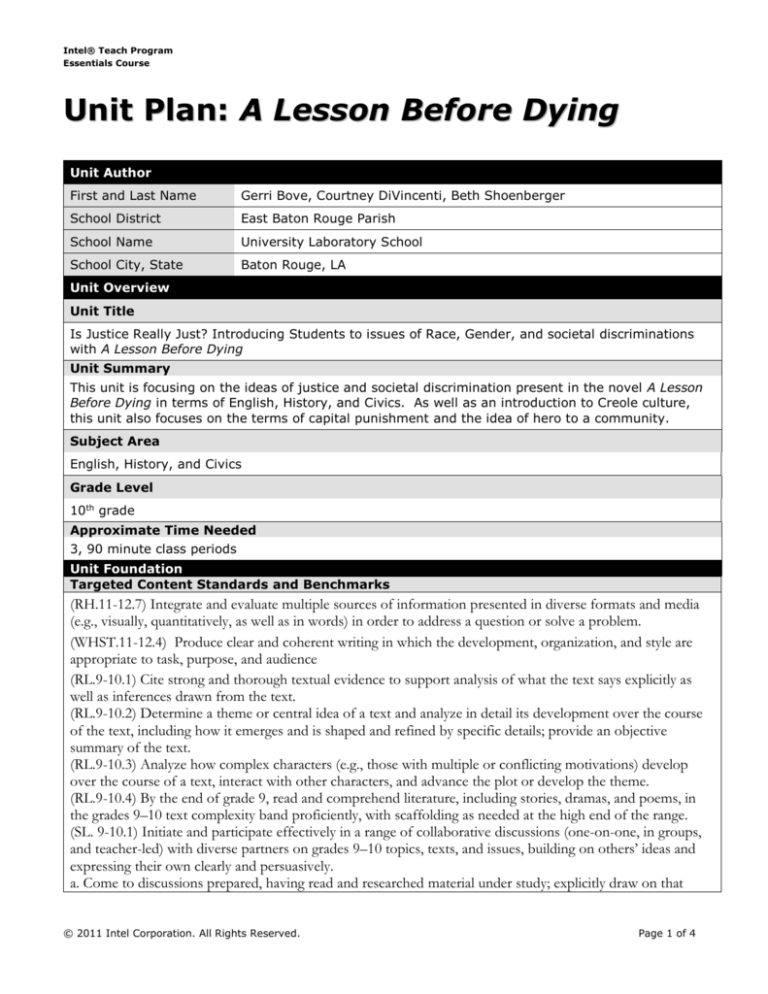
Intel® Teach Program
Essentials Course
Unit Plan: A Lesson Before Dying
Unit Author
First and Last Name
Gerri Bove, Courtney DiVincenti, Beth Shoenberger
School District
East Baton Rouge Parish
School Name
University Laboratory School
School City, State
Baton Rouge, LA
Unit Overview
Unit Title
Is Justice Really Just? Introducing Students to issues of Race, Gender, and societal discriminations
with A Lesson Before Dying
Unit Summary
This unit is focusing on the ideas of justice and societal discrimination present in the novel A Lesson
Before Dying in terms of English, History, and Civics. As well as an introduction to Creole culture,
this unit also focuses on the terms of capital punishment and the idea of hero to a community.
Subject Area
English, History, and Civics
Grade Level
10th grade
Approximate Time Needed
3, 90 minute class periods
Unit Foundation
Targeted Content Standards and Benchmarks
(RH.11-12.7) Integrate and evaluate multiple sources of information presented in diverse formats and media
(e.g., visually, quantitatively, as well as in words) in order to address a question or solve a problem.
(WHST.11-12.4) Produce clear and coherent writing in which the development, organization, and style are
appropriate to task, purpose, and audience
(RL.9-10.1) Cite strong and thorough textual evidence to support analysis of what the text says explicitly as
well as inferences drawn from the text.
(RL.9-10.2) Determine a theme or central idea of a text and analyze in detail its development over the course
of the text, including how it emerges and is shaped and refined by specific details; provide an objective
summary of the text.
(RL.9-10.3) Analyze how complex characters (e.g., those with multiple or conflicting motivations) develop
over the course of a text, interact with other characters, and advance the plot or develop the theme.
(RL.9-10.4) By the end of grade 9, read and comprehend literature, including stories, dramas, and poems, in
the grades 9–10 text complexity band proficiently, with scaffolding as needed at the high end of the range.
(SL. 9-10.1) Initiate and participate effectively in a range of collaborative discussions (one-on-one, in groups,
and teacher-led) with diverse partners on grades 9–10 topics, texts, and issues, building on others’ ideas and
expressing their own clearly and persuasively.
a. Come to discussions prepared, having read and researched material under study; explicitly draw on that
© 2011 Intel Corporation. All Rights Reserved.
Page 1 of 4
Intel® Teach Program
Essentials Course
preparation by referring to evidence from texts and other research on the topic or issue to stimulate a
thoughtful, well-reasoned exchange of ideas.
b. Work with peers to set rules for collegial discussions and decision-making (e.g., informal consensus, taking
votes on key issues, and presentation of alternate views), clear goals and deadlines, and individual roles as
needed.
c. Propel conversations by posing and responding to questions that relate the current discussion to broader
themes or larger ideas; actively incorporate others into the discussion; and clarify, verify,
or challenge
d. Respond thoughtfully to diverse perspectives, summarize points of agreement and disagreement, and, when
warranted, qualify or justify their own views and understanding and make new connections in light of the
evidence and reasoning presented.
(C.5.3) Describe how civil rights have evolved over time to include diverse groups of citizens.
(C.4.1) Describe the elements of United States domestic policy.
(C.2.6) Differentiate between loose and strict constructionist interpretation of the Constitution by examining
the meaning and implications of the Bill of Rights and subsequent amendments.
Student Objectives/Learning Outcomes
1. The student will be able to compare and contrast between various forms of Creole music.
2. The student will be able to identify social justice issues present in today’s society and in the
novel.
3. The student will be able to analyze the impact historical events had within the literary world
while also understanding how time period functions as part of setting, character traits,
actions, and conflicts.
4. The student will be able to use a variety of comprehension strategies to synthesize and
critique written and visual texts.
Curriculum-Framing Questions
Essential
How are different cultures portrayed in literature, history, and government?
Question
Unit
Questions
Content
Questions
What are the dominant themes of the novel? How are they worked out in
terms of the characters and their words and actions?
What are the various types of Creole cultures?
What issues of justice and civil rights are raised in the novel? How do these
issues relate to the wider issue of capital punishment?
How and why should we use this information to create more informed citizens?
Assessment Plan
Assessment Summary
For the English assessment, it involved the use of multimedia. Students were broken into groups to
complete the multimedia assignment. The assignment involved taking an in-depth look at the novel’s
characters, themes, setting, social hierarchy, and conflicts. To ensure students are grasping these topics, the
teacher reviewed the assignments as students were completing them and once they were submitted.
For the History assessment, students will be graded on their Podcasts. Students will be graded based on
their clarity, appropriateness to content, and three references to different aspects of creole culture.
For the Civics assessment, students will be broken into three groups and will create a Prezi on one of the
following social justice issues: Educational Segregation, Capital Punishment, and Gender Inequalities.
© 2011 Intel Corporation. All Rights Reserved.
Page 2 of 4
Intel® Teach Program
Essentials Course
Students will also be required to bring in a current event article dealing with their topic.
Unit Details
Prerequisite Skills
Students need to know basic reading and writing skills, as well as an ability to cite textual evidence.
They need to be able to communicate effectively in a group setting. Students need to be able to use
the computer and navigate the Internet.
Instructional Procedures
Lesson 1-Day 1
Lesson 2-Day 2
Lesson 3-Day 3
See Weebly
Accommodations for Differentiated Instruction
Special Needs
Students
Extra time on activities, time to correct mistakes, personal
assistance with complicated technology, tools to magnify monitor,
software to read out information on the Internet.
Nonnative
Speakers
Illustrated text, graphic organizers, assisted help from an ESL teacher that
comes in and helps the students, after school with tutors, separate class with
ELL teachers
Gifted/Talented
Students
Have more requirements for these students. In the English portion of the unit
plan, gifted/talented students will complete a 500 word theme analysis on the
novel. For the Social Studies portion, gifted/talented students will do an extra
assignment that involves research on an influential Creole figure. For the Civics
portion, students will be required to turn in an overview of the websites they
visited.
Materials and Resources Required For Unit
Technology – Hardware (Click boxes of all equipment needed)
Camera
Laser Disk
VCR
Computer(s)
Printer
Video Camera
Digital Camera
Projection System
Video Conferencing Equip.
DVD Player
Scanner
Other
Internet Connection
Television
Technology – Software (Click boxes of all software needed.)
Database/Spreadsheet
Image Processing
Web Page Development
Desktop Publishing
Internet Web Browser
Word Processing
E-mail Software
Multimedia
Other
Encyclopedia on CD-ROM
Printed Materials
Textbooks, novel, notes from class, list of resources
Supplies
Computers, notebooks, flash drives
© 2011 Intel Corporation. All Rights Reserved.
Page 3 of 4
Intel® Teach Program
Essentials Course
http://www.folkways.si.edu/louisiana-creolemusic/cajun/music/album/smithsonian
http://en.wikipedia.org/wiki/Music_of_Louisiana
http://www.pbs.org/jazz/biography/artist_id_armstrong_louis.htm
http://en.wikipedia.org/wiki/Courir_de_Mardi_Gras
http://www.law.cornell.edu/wex/death_penalty
http://www.loc.gov/exhibits/brown/brown-segregation.html
http://www.trinity.edu/mkearl/gender.html
Internet Resources
Other Resources
http://courthousehistory.com/images/gallery/Louisiana/Pointe%20Coupee
/New%20Roads%20-%20Old%20%20A_large.jpg
http://windowontheprairie.com/wpcontent/uploads/2010/05/Old_Jefferson_Town01.jpg
http://www.gnbvt.edu/Faculty/Teacher_Pages/MarshallPerry/ALBD.htm
http://en.wikipedia.org/wiki/A_Lesson_Before_Dying
http://esha650.edublogs.org/files/2008/06/lesson1.jpg
http://www.houmaweekly.com/img/feature/alessonbeforedying.jpg
http://bigreadblog.arts.gov/?cat=21
http://www.taghawaii.net/lesson_before_dying.jpg
http://www.wordle.net
Field trip to the Rural life museum, guest speaker from the Louisiana
Legislature, Lunch with Ernest Gaines
Copyright © 2008 Intel Corporation. All rights reserved. Intel, the Intel logo, Intel Education Initiative, and Intel Teach Program are trademarks
of Intel Corporation in the U.S. and other countries. *Other names and brands may be claimed as the property of others.
Copyright © 2011 Intel Corporation. All rights reserved. Intel, the Intel logo,
Intel Education Initiative, and the Intel Teach Program are trademarks of Intel
Corporation in the U.S. and other countries.
*Other names and brands may be claimed as the property of others.
© 2000-2007 Intel Corporation. All Rights Reserved.
Page 4 of 4

